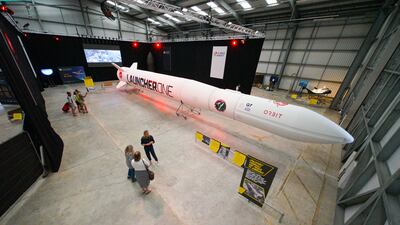There is nothing new about the prospect of future wars being fought in space. Back in the 1980s, former US president Ronald Reagan was subjected to much ridicule for his commitment to what became known as “Star Wars”.
Under the Strategic Defence Initiative (SDI), to give it its formal title, the US sought to develop a complex system of satellites and ballistic missiles that could intercept and destroy nuclear missiles launched by the Soviet Union in the event of conflict erupting between the two superpowers.
Although a great deal of initial research was carried out, the programme was eventually wound down in the 1990s by the Clinton administration following the collapse of the Iron Curtain, when the prospect of nuclear war had receded.
Thirty years on, and Reagan’s ground-breaking vision of waging war in space no longer looks so far-fetched, as major powers such as Russia and China look to exploit what has been termed the new frontier in modern warfare.
Indeed, the realisation that space is likely to have a key role to play in the conflicts of the future has persuaded Washington to revise its Star Wars programme after previous US president Donald Trump in 2019 signed the National Defence Authorisation Act, aimed at developing a new generation of space-launched missiles that Mike Pompeo, director of the Central Intelligence Agency at the time, referred to as “SDI II”, a direct reference to Reagan’s much-maligned programme.
The concept of rivalry in space between the world’s major powers is not a new phenomenon either. During the Cold War, the so-called space race between Washington and Moscow was defined by their intense competition to be the first to put a man on the Moon.
What is different about the modern-day struggle, though, is the potentially devastating impact it could have on our well-being. After all, it is all about which power can inflict the maximum amount of damage against an adversary through the application of space technology.
The estimated 3,000 satellites currently circling the globe play a vital role in our everyday lives, such as facilitating communications and travel. They also make a crucial contribution to the modern battlefield, which might explain why the world’s pre-eminent military powers are investing so much effort in acquiring the means to destroy them.


The growing importance of space in modern warfare is reflected in the British government’s announcement this week that it will join the space race this summer with the launch of two shoebox-sized satellites from Cornwall.
Equipped with sensitive defence technology, the so-called “cubesats” will be launched from Newquay airport on a Virgin One Launcher One rocket. It will be the first satellite launch from British soil and is aimed at demonstrating the country's ability to rival other spacefaring nations such as the US, Russia and China.
Britain has had satellites launched before – notably in 1971 in Woomera, Australia, as part of a space programme that was cancelled – but never from the UK itself.
The ability to launch British-made satellites from domestic soil has been a key goal for London, as it seeks to restructure its military capabilities to cope with the challenges of modern warfare. Since its establishment in 2010, one of the key objectives of the UK Space Agency has been to develop Britain’s ability to launch its own satellites.
The importance of space in warfare, moreover, was highlighted in last year’s publication of Britain’s defence review, which looked forward to the development of a constellation of intelligence, surveillance and reconnaissance satellites, as well as the creation of a National Space Operations Centre to track and identify various – specifically malevolent – activities in space.
The forthcoming launch of the new Prometheus-2 British satellites, which measure about 30 centimetres long, 20cm wide and 10cm deep and are designed to deliver sophisticated imaging sensors for British military commanders, therefore represents a significant step forward in the country’s space programme.

Jeremy Quin, the UK’s defence procurement minister, said this week: “Space technology is crucial for developing defence capabilities, and the launch of Prometheus-2 represents another important step forward for our homegrown space programme.”
Britain’s entry comes at a time of growing concern about the space capabilities being developed by a number of countries. Last year, for example, Moscow attracted widespread criticism after its successful test-firing of an anti-satellite missile.
In what was regarded as a highly provocative act, in November 2021, Russia’s new Nudol anti-satellite weapons system succeeded in destroying a defunct Soviet-era intelligence satellite. The destruction caused the formation of space debris, requiring the seven-man crew of the International Space Station to take shelter as debris passed their vessel every 93 minutes. The successful test-firing of the anti-satellite system nevertheless demonstrated Russia’s ability to disrupt and destroy rival satellite systems in space.
China, too, has recently demonstrated impressive new developments in its space-oriented missile capabilities, such as its recent test of a hypersonic glide vehicle, a maneuverable spacecraft that can carry a nuclear warhead, which has the ability to fire a separate missile in mid-flight.
There is mounting concern in the US that it is in danger of losing the new space race. Speaking at a conference in Virginia last month, Lt Gen Michael Guetlein, head of the US Space Systems Command, acknowledged that Russia and China “have the ability and the intent to compete against us for space superiority".
The Pentagon is now in the process of investing heavily to ensure its Space Command has the resources to withstand the new threat posed by its rivals. But with the US's so-called rivals already demonstrating their technical mastery of this new technology, there is no guarantee the West will be able to stay ahead in any future star wars.


